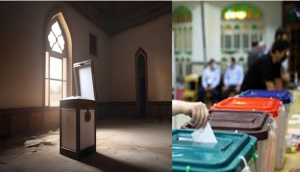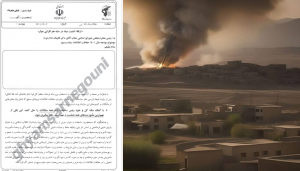(Video)Leaked Files Show Iran’s Regime Fears Defection Among MPs
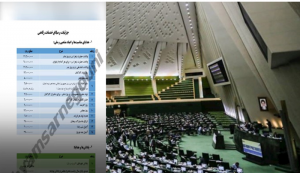
On Feb. 13, reports emerged about the News Agency, associated with the regime’s Parliament, being inaccessible, with the dissident group GhiamSarnegouni (Persian for Rise up to Overthrow) claiming responsibility, asserting control over 600 parliament servers.
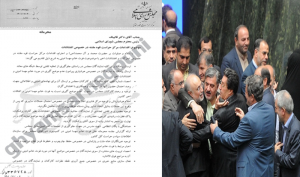
On September 25, 2022, in a letter to the Speaker of the Parliament, related to protests, including warnings to representatives not to take a stance on Mahsa Amini’s case, surveillance of all parliament members’ and staff’s phone numbers for potential monitoring.
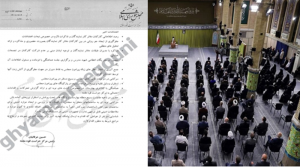
Documents shows that during the 2022 uprising, the regime was deeply concerned about potential defections among its own authorities to take political stances contrary to the ruling establishment.Also, confidential report addressed to the Speaker of the Parliament.
One of the most revealing part of these documents is the disclosure of the special budget allocated to the Quds Force of the Islamic Revolutionary Guard Corps.
These included the main server, commission servers, the main hall server, the parliament’s bar server, database servers, representatives’ offices, international affairs departments, and research centers.
The leaked information unveiled insights into the regime’s security measures and its intervention within the Islamic Consultative Assembly (Majlis).
Documents indicated that during the 2022 uprising, the clerical regime was deeply concerned about potential defections among its own authorities and their inclination to take political stances contrary to the ruling establishment. Reports suggest that certain MPs received “briefings” from security agencies, either in person or via phone calls. Additionally, a confidential report addressed to the Speaker of the Parliament M.B. Ghalibaf highlighted certain MPs, being categorized as disruptive representatives.
Security agencies also announced monitoring parliament members’ and staff’s phone numbers to prevent participation in protests and collaboration with protesters. This surveillance extended to “parliament members’ office staff,” while the Legislative Branch’s security stressed the need to prevent “psychological tension” among them and their involvement in street protests.
The Parliament’s Security Council, in a report to Ghalibaf regarding the actions taken during the nationwide protests of 2022, stated that they monitored the potential presence of MPs and staff in gatherings and protests by disruptors, stationed police and Basij vehicles in the parking lots and around the parliament, and removed garbage bins from around the parliament to prevent people from setting them on fire.
The state-run Ruydad 24 wrote on February 15, “The hacker group claimed that on September 25, 2022, the Security Department of the Legislative Branch, in a letter to Mohammad Bagher Ghalibaf, the Speaker of the Parliament, reported security measures related to protests, including warnings to representatives not to take a stance on Mahsa Amini’s case, surveillance of all parliament members’ and staff’s phone numbers for potential monitoring of their presence at gatherings, and the relocation of trash bins away from the parliament premises to prevent them from being set on fire by protesters, actions that appeared peculiar. The Security Department also informed the Speaker that some representatives, including Rashidi Kouchi, Pakfetrat, and Khodarayan, were considered disruptive elements. It is worth mentioning that Jalal Rashidi Kouchi has been disqualified from running in the twelfth parliamentary elections.”
Furthermore, images circulated by state media suggest that a session in parliament on February 14 has encountered difficulties due to issues with the electronic voting system.
Unlike the usual electronic voting procedure, MPs were forced to physically stand up to vote due to the system’s malfunction.
Also on February 14, the newspaper Kayhan, dedicated an entire article, suggesting that the goal of the cyber-attack was to “tarnish the elections to undermine the credibility of the parliament.”
The newspaper, whose editorial guidelines are directed by the Office of the Supreme Leader, attributed yesterday’s events to espionage activities of the CIA and Mossad. Kayhan acknowledged the significant impact of this incident on the internal dynamics of regime forces, asserting that “a mafia-like coalition of foreign adversaries and domestic traitors is collaborating to instill distrust among revolutionary forces and pit them against each other.”
The security and stability of the Iranian regime, which strives to present itself as the region’s formidable power, have once again been undermined by the seizure of 600 servers of its parliamentary system. This incident has become a subject of discussion both domestically and internationally.
The GhiamSarnegouni (Persian for Rise to Overthrow) dissident group has publicly disclosed documents indicating that members of the parliament have effectively been excluded from the country’s decision-making process. Instead, Mohammad Bagher Ghalibaf, the Speaker of the Parliament, whose corruption scandals were widely known, has now become a facilitator for Ali Khamenei and the Islamic Revolutionary Guard Corps at the regime’s legislative arm.
One of the most revealing parts of these documents is the disclosure of the special budget allocated to the Quds Force of the Islamic Revolutionary Guard Corps.
General Mohammad Baqeri, Chief of Staff for the Armed Forces, writes that in the previous year’s budget, 7.7 trillion tomans were allocated to the Quds Force. He requested Ghalibaf to separately add this amount to the Revolutionary Guards’ budget.
As a result of these communications between Baqeri and Ghalibaf, the budget for the armed forces increased to over 138 trillion tomans. With the addition of the special budget for the Quds Force, it reached an astronomical amount of 145 trillion tomans.
This marks the first time that the Quds Force’s budget has been made public. This institution, which has been involved in large-scale corruption and money laundering schemes for years, has diverted billions of tomans from the public budget to pursue Khamenei’s power-driven policies aimed at destabilizing the region.
In a confidential letter dated February 21, 2023, the Chief of Staff of the Armed Forces requested a separate budget allocation for the Intelligence Protection Organization of the ّIRGC. The letter emphasized that the security division of the Islamic Revolutionary Guards Corps (IRGC) is tasked with addressing intelligence gaps within the organization and requires dedicated funding and protection.
One of the disclosed documents reveals a letter written by Gholamreza Jalali, the head of the Passive Defense Organization, to Ghalibaf.
The letter issues a warning that repeated alerts to the Atomic Energy Organization regarding the fortification of nuclear sites and facilities have not been heeded, leaving them vulnerable.
For instance, it is emphasized that “some nuclear facilities have been constructed in inappropriate locations. The Isfahan reactor, the construction of the propulsion reactor within the highly hazardous and sensitive Tehran compound, and the construction of the Tetra Center in the Tehran compound have not received attention.”
Additionally, it is highlighted that “spent fuel from previous years in the Tehran research reactor remains in the densely populated urban fabric of the capital.” Jalali warns in the letter that there are vulnerabilities in nuclear facilities that could lead to any kind of incident, yet these issues have not been addressed by the regime’s Atomic Energy Organization.
Other documents disclosed during the seizure of the parliament’s servers indicate that the Secretary of the Supreme National Security Council had predicted sabotage and disruption in the gas pipeline in a letter to Khamenei and Raisi on November 27, 2023.
The letter warns about gas imbalance and the gap between production and consumption, citing factors such as cyber threats, labor strikes, and sabotage in the energy network as reasons that could jeopardize energy security.
It’s worth noting that some state-run media outlets have also been reporting about events within the parliament, referring to documents leaked by this dissident group.
In a detailed report, the website Ruydad 24 wrote, “The hacking group claims to have released a letter from Gholamreza Jalali, the head of the Passive Defense Organization, to Qalibaf, criticizing the failure to follow standard protection measures for atomic sites. The parliament has been urged to oversee the implementation of these measures. One part of the letter mentions that ‘spent fuel from previous years in the Tehran research reactor’ is still present in the densely populated urban areas of the capital. Another part mentions that ‘two nuclear facilities’ were supposed to be moved to a secure location as per the Leader’s directive, but this hasn’t happened.”
To subscribe weekly Newsletter of NCRI, please use this link. https://bit.ly/3SMgEla
Shahin Gobadi
NCRI
+33 6 61 65 32 31
email us here
The leaked information unveiled insights into the regime’s security measures and its intervention within the Islamic Consultative Assembly (Majlis).
Legal Disclaimer:
EIN Presswire provides this news content "as is" without warranty of any kind. We do not accept any responsibility or liability for the accuracy, content, images, videos, licenses, completeness, legality, or reliability of the information contained in this article. If you have any complaints or copyright issues related to this article, kindly contact the author above.

